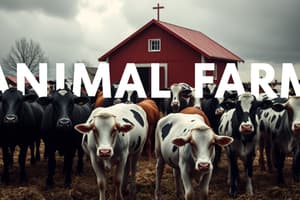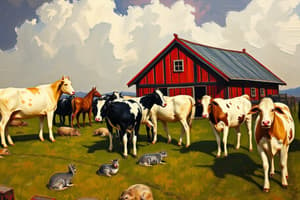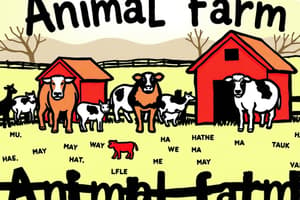Podcast
Questions and Answers
What is the main event of Chapter 1?
What is the main event of Chapter 1?
- Rebellion
- Old Major's speech (correct)
- Boxer's Cruel death
- Battle of the Cowshed
What significant event occurs in Chapter 2?
What significant event occurs in Chapter 2?
- Snowball's expelled
- Rebellion (correct)
- Old Major's speech
- Battle of the Windmill
What does Chapter 3 primarily discuss?
What does Chapter 3 primarily discuss?
- The rebellion and slaughtering of the animals
- Windmill Brainwashing
- All about the pigs (correct)
- Boxer's Cruel death
What battle is featured in Chapter 4?
What battle is featured in Chapter 4?
What happens to Snowball in Chapter 5?
What happens to Snowball in Chapter 5?
What theme is discussed in Chapter 6?
What theme is discussed in Chapter 6?
What does Chapter 7 describe?
What does Chapter 7 describe?
What battle occurs in Chapter 8?
What battle occurs in Chapter 8?
What tragic event is covered in Chapter 9?
What tragic event is covered in Chapter 9?
What transformation occurs in Chapter 10?
What transformation occurs in Chapter 10?
Flashcards are hidden until you start studying
Study Notes
Chapter 1: Old Major's Speech
- Old Major, an elderly boar, calls for a meeting to share his vision of a rebellion against human oppression.
- He introduces the idea of Animalism, emphasizing equality and shared ownership among animals.
- Motivating speech highlighting the sufferings of animals under human control.
Chapter 2: Rebellion
- Inspired by Old Major’s ideas, the animals band together to overthrow Mr. Jones.
- Successful uprising leads to the establishment of Animal Farm, a symbol of hope and change.
- The principles of Animalism are officially adopted, with the Seven Commandments written.
Chapter 3: All About the Pigs
- Pigs take leadership roles, claiming they are the most intelligent.
- Establishment of the privileges of the pigs, who oversee farm management and decisions.
- Introduction of the idea of equality, yet favoritism towards pigs begins to emerge.
Chapter 4: Battle of the Cowshed
- Humans attempt to retake the farm, resulting in the Battle of the Cowshed.
- The animals, led by Snowball, successfully defend Animal Farm.
- This battle reinforces their unity and commitment to the rebellion’s ideals.
Chapter 5: Snowball's Expulsion
- Tension rises between Snowball and Napoleon, leading to a power struggle.
- Snowball is expelled by Napoleon’s dogs, marking the beginning of a dictatorship.
- Revision of history as Napoleon portrays Snowball as a traitor.
Chapter 6: Windmill Brainwashing
- The construction of the windmill, representing progress, becomes a major focus.
- Napoleon uses propaganda to maintain control and manipulate other animals’ views.
- Increased labor and sacrifices demanded from the animals, justified by the promise of the windmill's benefits.
Chapter 7: Rebellion and Slaughtering of the Animals
- Repression increases as Napoleon eliminates dissent; animals confess to false crimes.
- The hens protest against egg production demands, leading to brutal crackdowns.
- The principles of Animalism are increasingly corrupted as fear and violence take hold.
Chapter 8: Battle of the Windmill
- A second attack from humans results in the destruction of the windmill.
- The battle signifies the hardening of Napoleon’s regime, as propaganda shifts to glorify the pigs’ leadership.
- Animals face harsh conditions, but loyalty is manipulated through fear and the memory of past victories.
Chapter 9: Boxer's Cruel Death
- Boxer, the hardworking horse, sustains injuries but remains loyal until the end.
- His tragic fate reveals the betrayal of the working class as he is sold to a glue factory.
- This moment underlines the disillusionment of the animals with their leaders.
Chapter 10: Animal Farm Becomes Manor Farm
- The transformation of Animal Farm into Manor Farm signifies total betrayal of the original revolution.
- Pigs begin to adopt human traits, including walking on two legs and wielding whips.
- Final blurring of lines between animals and humans, demonstrating the cyclical nature of power and oppression.
Studying That Suits You
Use AI to generate personalized quizzes and flashcards to suit your learning preferences.




